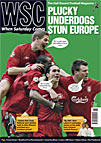 The Italian authorities have reacted hard to recent embarrassments, but are also groping their way towards a more positive ‘English solution’, writes Paul Virgo
The Italian authorities have reacted hard to recent embarrassments, but are also groping their way towards a more positive ‘English solution’, writes Paul Virgo
The shower of flares that halted Internazionale’s Champions League derby with AC Milan triggered some tough talking from the Italian authorities. Police have been instructed to call off matches at the first sign of trouble, inside or outside the stadium. Likewise, the Italian federation (FIGC) has given referees instructions to suspend matches if fans hurl flares or other missiles. Turnstile checks have been beefed up to make it more difficult to smuggle flares or offensive banners into the grounds. Teams whose fans are responsible for trouble causing a match to be abandoned will automatically lose the game 3‑0. If the trouble involves both sets of fans, both teams lose 3‑0.
The courts are also chipping in. A Juventus fan got a stiff eight-month prison spell for his part in trouble before the recent match against Liverpool in Turin. The sentence is designed to deter and three other Juventini on trial for ructions that night can expect similar treatment. The FIGC disciplinary tribunal, meanwhile, are trying to rein in players who set a poor example. Roma captain Francesco Totti, a serial offender, was handed a five-match ban for giving Siena defender Francesco Colonnese a kick and a slap in April. Juve’s Zlatan Ibrahimovic got a three-match ban for doing a wrestling-style neck drop on Inter’s Ivan Cordoba.
The system has the merit of hitting fans where it hurts most, in the league standings, and the first few weekends of the new regime passed off peacefully. However, there’s scepticism as to how effective it will be in the long run. The clubs are unhappy that the policy effectively gives fans the power to determine results. Chairmen have even suggested fans might send undercover troublemaking squads into rival stands to engineer results for their team. The policy may collapse if the clubs refuse to accept the punishment – something that’s highly likely if the incident involves a big name, such as Juventus or AC Milan.
The other risk is that the hard line will mellow over time. There are signs this process has already started. FIGC chief Franco Carraro, for example, initially said matches should be stopped as soon as the first flare lands on the pitch. But after complaints from the clubs he later said that “one flare will not be enough”. At the recent Lazio v Juventus game, Juve fans held up a Fascist banner calling Italian Liberation Day – April 25 – the “holiday of traitors”. But the police made no attempt to remove the banner and FIGC only gave the club a fine, no points deducted, because the match was not played at Juve’s stadium.
Interior Minister Giuseppe Pisanu has called for legislation allowing greater use of video surveillance, electronic ID cards to keep tabs on fans and stronger police powers. He had previously tried to introduce these measures, but was frustrated in parliament.
Indeed, part of the problem is Italian politicians’ inability to find a consensus over the issue. Communist Party president Fausto Bertinotti, for example, blasted the latest crackdown, arguing the government should focus on the “social causes” of crowd trouble. This, presumably, would mean dealing with hooliganism via the long route, with policies to improve run-down areas and motivate troubled youth.
That said, no one thinks simply cracking down on trouble will suffice. Understandably, the “English solution” has become quite the thing. Pisanu wants eventually to remove the barriers inside Italian stadiums and create a system where order is kept mainly by stewards co-ordinated by the clubs, rather than police.
Getting to that point, though, won’t be easy. Italy’s stands are already regulated, in a fashion, by the ultra chieftains. The ultras’ passion, colour and choreographies are an integral part of matchdays. But, able to hold clubs to ransom by threatening riots or reprisals, some groups have grown too powerful and extremist. Inter coach Roberto Mancini failed to condemn the fans’ behaviour after the derby debacle, probably because he was scared of antagonising the militant fringes. The police still refuse to go into the curve (the end stands) for fear of creating riots, so what chance would stewards have of keeping the ultras in check?
Even now many ultras view their excesses as a minor evil in a world of doping, overpaid players and conflicts of interest. They consider the crackdowns unjustified and the fact that the Italian policing of football seems to have only two gears – “batons ready” and “baton charge” – does not help perceptions.
None the less, everyone would be happy to see the barriers go away and the English model is not seen as a threat to the fan culture. The ultras’ power undoubtedly needs clipping, but if the ultimate aim is lots of stewards and better fan self-regulation, some dialogue with them is needed, too. They might even have some positive ideas that Lord Taylor didn’t think of.
From WSC 220 June 2005. What was happening this month